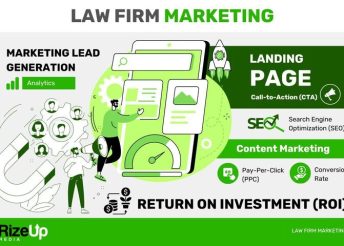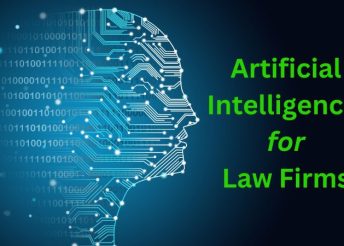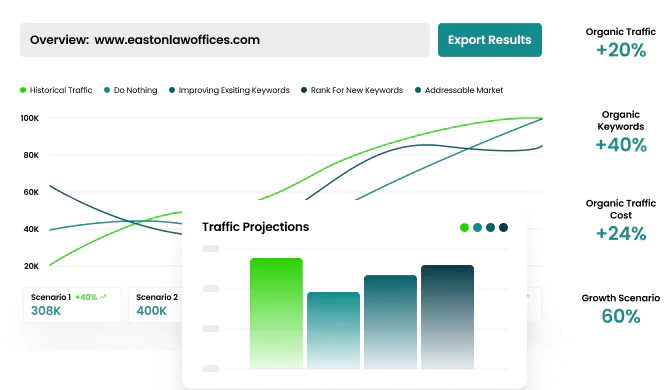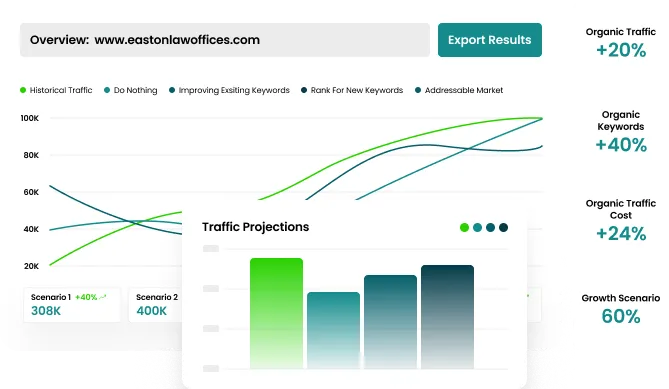Artificial Intelligence for Lawyers – 9 Ways AI Can Boost Law Firm Growth
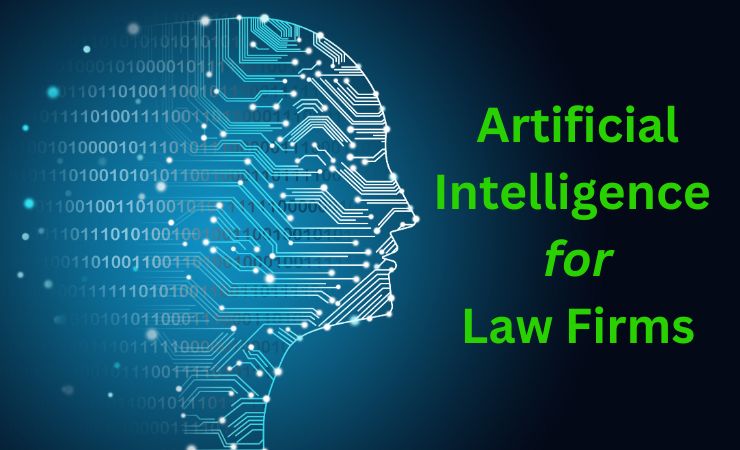
As an attorney competing in the modern marketplace, you need to be sure that every phase of your legal operation is efficient, productive, and effective. That is how you will be able to gain new clients, build a reputation, and ultimately increase your profits.
The strategies you use to accomplish these broad goals will be informed by the sort of law you practice and your target audience. Making timely and meaningful connections with people who have been injured on the job will be essential for workers’ compensation attorneys. If someone is considering ending their marriage and has questions about the divorce process, they may begin their search online, creating an opportunity for a divorce attorney with a great, informative website.
As technology advances, Artificial Intelligence, or AI, is likely to play an increasing role in these strategies for some firms. Powerful natural language AI tools like ChatGPT are already changing the way people in many fields, including law, do business.
How AI for Lawyers Can Help Grow Your Firm
A lawyer might use AI tools in a variety of ways. Incorporating pre-packaged AI solutions like chatbots into your practice’s website can be effective because it streamlines and standardizes the all-important process of making initial contact with a prospective client. An AI model trained on thousands of legal cases might even help a lawyer predict potential outcomes for a client or help them find a historically successful angle from which to approach building a defense strategy. Automated data analysis and AI-based organizational tools can also protect your data and manage documents so that any information you need is at your fingertips.
Effectively deploying AI as a part of your legal practice can save time on repetitive administration and marketing tasks, allowing you to focus your attention on clients and their cases. The team at RizeUp Media can help you understand what AI programs are available, how they can benefit your law firm, and what AI strategies to avoid (such as allowing robots to write your web content, which can result in feeding false information to your clients, damaging your reputation).
What Is Artificial Intelligence?
Artificial Intelligence (AI) is a broad term that encompasses a variety of groundbreaking technologies that simulate, or are based on, natural human intelligence and which can change and adapt their “thought” patterns pursuant to new data. When built effectively, AI results in computer programs with powerful problem-solving and communication capabilities.

While it is important not to get caught up in the online hype, which may give you unrealistic ideas about AI’s current limitations and applications, it’s also important to accept that AI represents a transformative and revolutionary paradigm that will eventually touch every area of human life. That includes your legal practice. Employed effectively, today’s AI tools are already capable of helping you analyze vast amounts of data, interpret patterns, draw insights, streamline processes, reduce human error, and communicate with your clients more effectively.
How AI Impacts Law Firms
Your work, and your success to date, have likely relied on your deep knowledge of the law and your firsthand courtroom experience. This can make it difficult to see how AI can benefit your firm. Before we move on to specific applications, consider these four ways that Artificial Intelligence can improve your practice:
Improved Accuracy
When you practice law, you deal with large amounts of data on a regular basis. Accuracy is paramount when dealing with the various documents, statements, contracts, affidavits, etc., that are key to the legal profession because even a small mistake can be costly to you and your clients. AI programs are able to analyze vast datasets quickly and without human prejudice.
Automation
Some administrative tasks that have to be done around the office are essential but tedious. You may be able to incorporate an AI program into your practice in order to automate certain tasks, like low-level research or providing initial drafts of contracts. This will free up your valuable time so you can give personalized attention to your cases.
Increased Efficiency
When you are working on a high-stakes case, time is of the essence. Your client is relying on you to compile evidence and craft their defense or litigation strategy efficiently so that the case can be steered toward a positive outcome as quickly as possible. AI programs can improve efficiency in your office by taking on some of your workloads when it comes to things like reviewing documents and connecting with potential clients. When your office is working more efficiently, it can lower your overall costs, increase your profits, and lighten your personal workload so you can provide better services to your clients.
Help with Decisions
The legal field is vast, and lawyers of all sorts regularly find themselves faced with nuanced or downright challenging situations. Whether you work on cases dealing with domestic violence, environmental law, or tax policy, the vast interconnected webs of state and federal statutes that inform our legal landscape can be difficult to navigate, even with the proper training and background. When you are given a case with an unfamiliar premise, it can be difficult to know what the right course of action is. Using an AI program may help make the decision-making process easier by analyzing previous cases to help predict possible outcomes or identify trends within a certain practice area so you and your clients know what to prepare for.

While these emergent technologies may feel unfamiliar or strange to you today, incorporating AI tools into your practice can potentially lighten your workload and give you the opportunity to focus more attention directly on your clients and their needs.
9 Ways AI Can Boost Growth
As you continue to grow your firm through strategies like maintaining a social media presence or improving your website design, it is important to find the tools and resources that meet your needs. Here are nine of the top ways that AI tools can contribute to your law firm’s growth.
1. Easier Research
Many of the most effective legal strategies rely on finding and analyzing previous cases with similar elements. To find this information, you have to do research. NLP, or Natural Language Processing, programs are AI tools that can help you with your research. This makes the research process much easier for you because the information is delivered directly to you in the same natural language a great assistant would use.
2. Managing Documents
One of the most important aspects of a legal case is ensuring that all of the paperwork and documentation is in order. If a client is applying for a work visa, for example, and one piece of information on their application is incorrect, their entire application may be denied, and they will not be able to enter the country legally. An environmental lawyer who is trying to protect wildlife habitat in their area may lose the opportunity if they are missing the correct petition.
AI-based data management suites can help you catalog and organize your various types of documents to avoid these mistakes and can be customized to help with workflows specific to your legal practice areas. Even if you’re partial to your old-school filing cabinet system, 2023 may be the year to move over to a digital, automated document management platform. AI-powered document management can improve your accuracy, make your work more efficient, and help you move forward with confidence, knowing your paperwork is in order.
3. Reviewing Contracts
If you are creating a legally binding contract, whether your client is selling their business or creating a parenting agreement during their divorce, having all of the information correct and drafted in legally actionable language is essential. The process of reviewing a contract can be tedious; they are often several pages long and may have multiple sections outlining the minutiae of the contract agreement.
If you miss a small mistake or typo, the entire contract may fail to hold up in court, representing disaster for you and your client alike. You can utilize machine learning AI tools like LawGeex or Kira Systems to review contracts for you. These programs are specifically designed for working with contracts and can scan them for problems on a provision-by-provision basis. AI contract review helps reduce your workload and minimizes the risk of errors.
4. Chatbots
When someone needs information about how to proceed with a time-sensitive legal issue, such as getting a court order put in place, they will likely turn to the internet in hopes of finding a quality resource for help. As a talented and successful lawyer, you have extensive experience that could help such a person, but you may not have time to answer phone calls, or they may need help outside of your business hours.
One AI tool that can help with early client connections like this is a chatbot. The process of taking in new clients can be time-consuming because you need to gather details of their case, figure out how their goals in seeking legal help, and schedule an initial meeting. A chatbot can get all of this done without any hands-on work required of you or your office staff. These AI programs are structured to ask questions about what services a client needs and let them know what your firm offers. A chatbot can improve the experience a potential client has on your website because it means responsive and knowledgeable help is available at any time, day or night.
5. Client Reviews
If you help a client who is happy with your services, such as helping someone avoid a jail sentence after a wrongful criminal conviction, they may leave a positive review on Google or Yelp!, or you can even set up a section on your own website for reviews and testimonials.
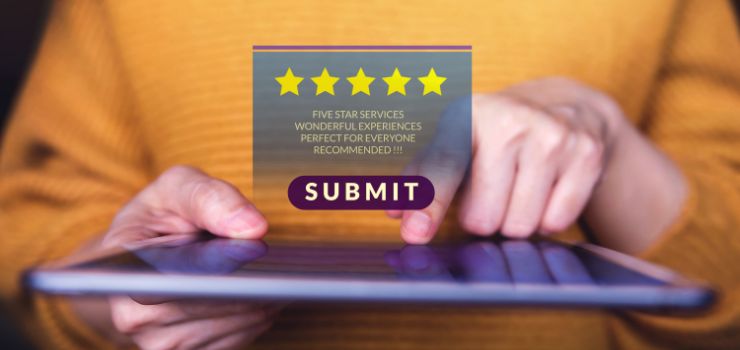
On the other hand, if a client is unhappy because you were unable to meet the unrealistic expectations they came to you with, they might leave negative. Both of these reviews can be impactful for your business, and AI programs can help you manage them. You could use a web-connected AI program to scan and analyze the feedback you receive from clients. This can help you identify common issues that clients may have with your services so that you can improve in those areas. It can also alert you of new reviews online so that you can respond to them in a professional and productive way.
6. Simplify Analysis
Gathering evidence and information for a complex case, such as a workers’ compensation claim, can be tedious and challenging, especially when scant firsthand evidence is available, and extensive documentation and testimony are required. Analyzing all of this material takes hours of time and attention so that you do not miss anything.
The day-to-day aspects of running a legal practice also require document analysis in the form of looking at billing statements, expense reports, etc. AI can be used to simplify or automate various analytical processes so you do not have to commit hours of your valuable time to comb through data. AI analysis can help identify trends and patterns in data of all types.
7. Increase Site Traffic
Today’s prospective clients use their phones and computers to search for information quickly, so one of the main ways potential clients will find your firm is through a search engine. You can make it more likely that your website appears at the top of a results page through a process known as Search Engine Optimization, or SEO. This process helps you to optimize content to draw in as many clients as possible, and AI is a powerful tool to help with this.

For example, keywords are an essential concept when implementing SEO because, when you include them in metadata and blog posts, they show search engines like Google what the content of your site is about. An AI program can generate a list of the most effective keywords for your practice, whether you are a criminal defense lawyer or a bankruptcy lawyer, and help you plan great content that includes those keywords. Natural language tools like ChatGPT can even help you write an outline or first draft for your content.
8. Reaching New Clients
When you are trying to grow your law firm, it is essential that you are able to find and connect with new clients. AI programs can be used to generate new client leads by looking at data like common search terms in your area or identifying unique factors that can help you market to your specific clientele. That data can then be used to create marketing and outreach campaigns highlighting your experience and offerings.
9. Secure Documents
Your clients share sensitive information with you. Keeping that information and the documents that contain it secure is essential to building a reputation as a trustworthy attorney. Natural language AI programs can be trained to scan documents, find personal information like names and phone numbers, and redact them so that they can be shared with colleagues as needed without compromising your client’s right to privacy.
Incorporate AI Into Your Website Design with RizeUp Media
The decision to incorporate AI into your law firm can have a serious impact on your growth and profitability, but in 2023 it’s crucial to have a real understanding of what AI can do for you and what its limitations are. The team at RizeUp Media has experience with a variety of web services and data management strategies and a track record of success employing these tools for law firms.
 We are prepared to help you find the AI tools you need to take your legal practice to the next level. Whether you want to include a chatbot on your website to engage new clients or put an AI system in place to analyze previous cases, our team can help. Contact us today to get started.
We are prepared to help you find the AI tools you need to take your legal practice to the next level. Whether you want to include a chatbot on your website to engage new clients or put an AI system in place to analyze previous cases, our team can help. Contact us today to get started.
Our Latest Blog Posts
Law Firm Marketing: A Comprehensive Strategy Guide for Lawyers
How an Effective Marketing Strategy Can Help Your Law Firm Grow In…
Artificial Intelligence for Lawyers – 9 Ways AI Can Boost Law Firm [...]
As an attorney competing in the modern marketplace, you need to be…
Personal Injury Lawyer SEO – The Ultimate Guide to Drive More Traffic [...]
In the fiercely competitive landscape of legal services, standing out with a…
Testimonials
Here's What Our Clients Are Saying




Travis and his team are responsive, creative, and attentive. They are attuned to the specific needs of my business. Highly recommend them!
Dorie Rogers


We have been using large nation-wide firms for marketing. And as usual, initial good service that tails off and gets worse. When Bo decided to open his own firm, I trusted that his attention to detail and personal service would be great, and I was right. RizeUp has…
Juan Armenta


RizeUp Media has taken an active, turnkey approach to our digital marketing. They provide a strategic, integrated and cost-effective marketing plan that is tailored to our short- and long-term revenue growth objectives. I have worked with Bo Bryant & Travis Hoechlin for several years now and their expertise,…
Jason Martinez


RizeUp Media delivers! I have used other marketing services, but none compare to the outstanding results RizeUp delivers. The company is professional, friendly, helpful and deliver where other marketing services fall short. Highly recommended!!
Michelanne Hrubic


RizeUp has been terrific. Their team of truly experienced experts and professionals worked very hard to put our business first.
Andrew Chivinski


We have tried three different web development companies and RizeUp is really the strategic partner we were looking for. They went beyond just putting up a website. They focused on what made our firm different and our goals regarding which clients to reach. I truly feel that we…
Drummond McCunn


I have used them for several months, after switching from Findlaw. They rock.
Raymond Hane


I recently started working with RizeUp Media for my law firm’s website and SEO work. I am so impressed with this company and highly recommend them.
Bill Cumming


We switched to RizeUp early in the year, and the new web site launched 3 months ago. We've already seen a solid uptake in calls from the web site, and a higher number of potential clients. Very solid work, and the people are friendly, responsive, professional, and great…
Matt Bangerter


We switched providers to RizeUp Media a few months ago. I was tired of having to worry about our website and the SEO work that is required to keep up with all the changes in Google Search. My prior provider was not responsive and barely did anything. RizeUp…

